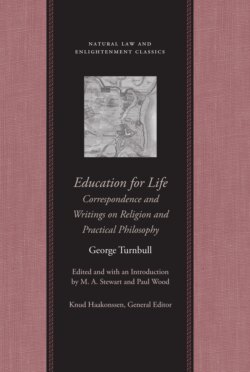Читать книгу Education for Life - George Turnbull - Страница 29
На сайте Литреса книга снята с продажи.
Оглавление[print edition page 100]
[print edition page 101]
ADVERTISEMENT TO THIS EDITION
This ENQUIRY, with the APPENDIX, is offered by the Author to the consideration of some late writers against Christianity, to the Moral Philosopher in particular; for he thinks it contains a satisfying answer to all that Author has said about miracles, after many others.2 He begs leave only to ask them one question, and it is, Whether they think it probable that virtue would be more prevalent and universal in a state where the genuine doctrines of Christianity concerning our duties to GOD, ourselves and our neighbours, and a future life, are believed; or in a state where a future life is not believed, and moral duties are not inculcated or inforced from that belief? If this should be said to be a Query that does not belong to the question about the truth or falshood of the Christian Religion, yet sure it cannot be said to be a Query that does not relate to the happiness of mankind and human society. As for the truth of Christianity, it must come to the plain simple question stated and answered in the following Essay, Whether the doctrine of JESUS CHRIST concerning a future state, which is obviously a strong motive to virtue, be not proved true by the Miracles which CHRIST wrought to prove it, in a way that is strictly philosophical and unexceptionable,
[print edition page 102]
at the same time that it is obvious to the meanest capacity; and that it is, must be admitted by all who allow experimental proof to be a good proof, or, in other words, samples to be samples of what they are samples; for the works of CHRIST are proper and adequate samples of his doctrine. The way in which Miracles are considered in this Essay is quite new, tho’ very simple and obvious, and indeed demonstrative; I have not met with it in any defence of Christianity; and I am sure it hath never been adverted to by any writer against Christianity.
I think myself obliged to take notice, that the abridger of this Essay, in the Bibliotheque Raisonneè, has no where mistaken my meaning but in one place, p. 22. But says a noble author, &c.3 I don’t say that Lord Shaftsbury intended to make an objection against Christianity; I only give his words, and thence I take occasion to expatiate at greater length upon the evidence which CHRIST gave of the truth of his doctrines, and to prove that as power can only be proved by samples, so honesty can only be proved by samples, and therefore that CHRIST gave full proof of his doctrine by giving proper samples of his honest and good intention, as well as of all the power and knowledge he claimed. <1>
